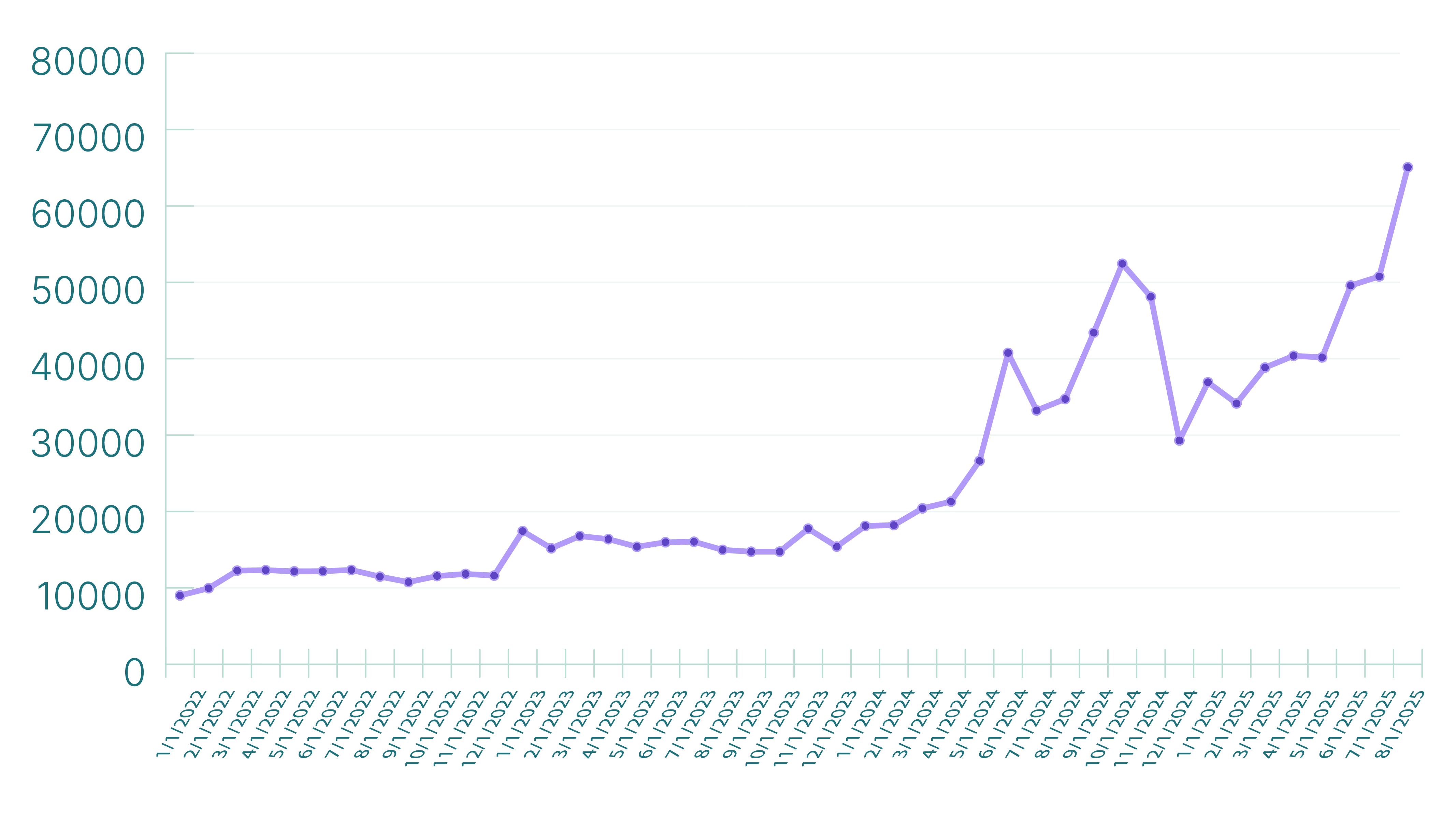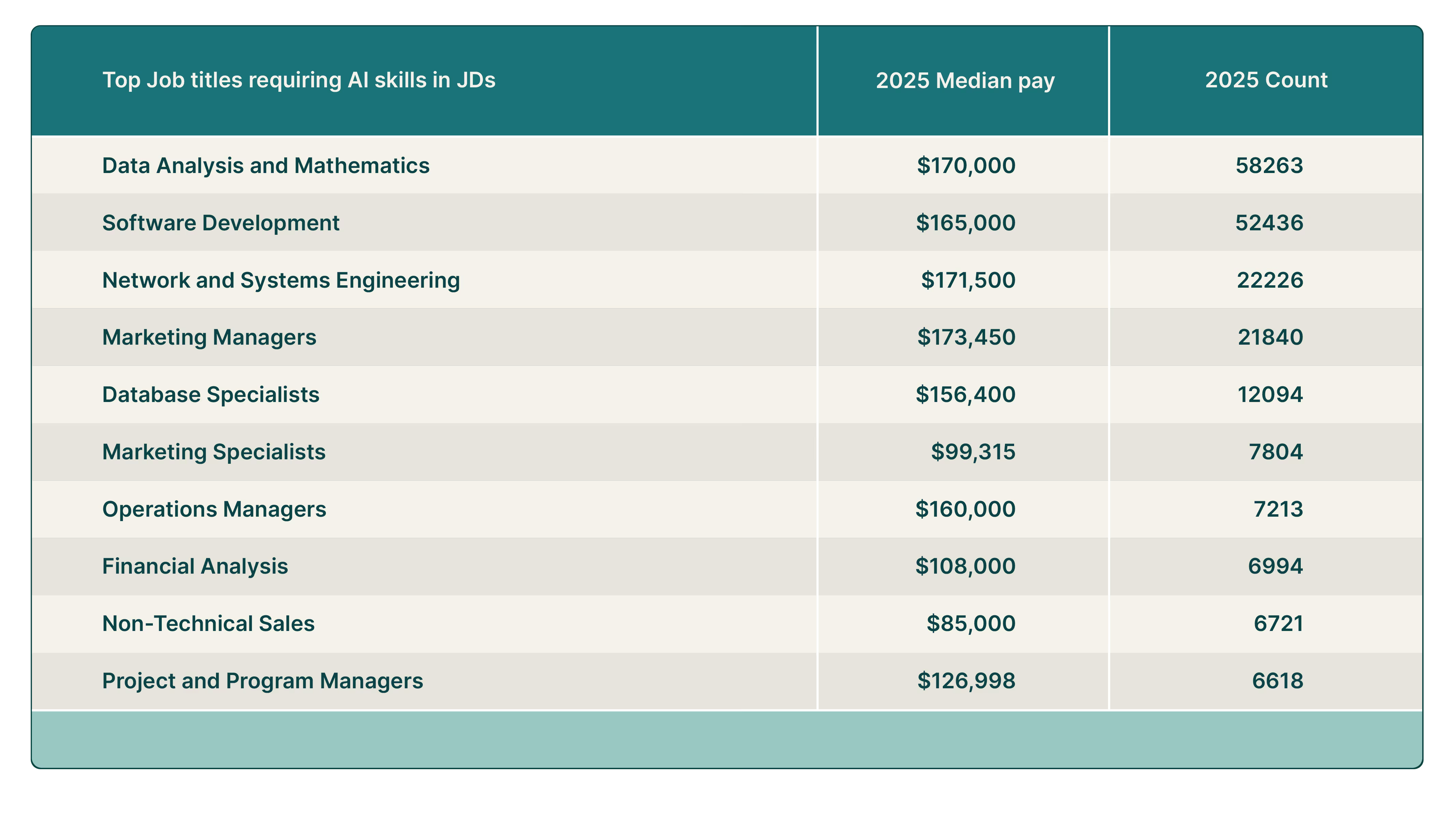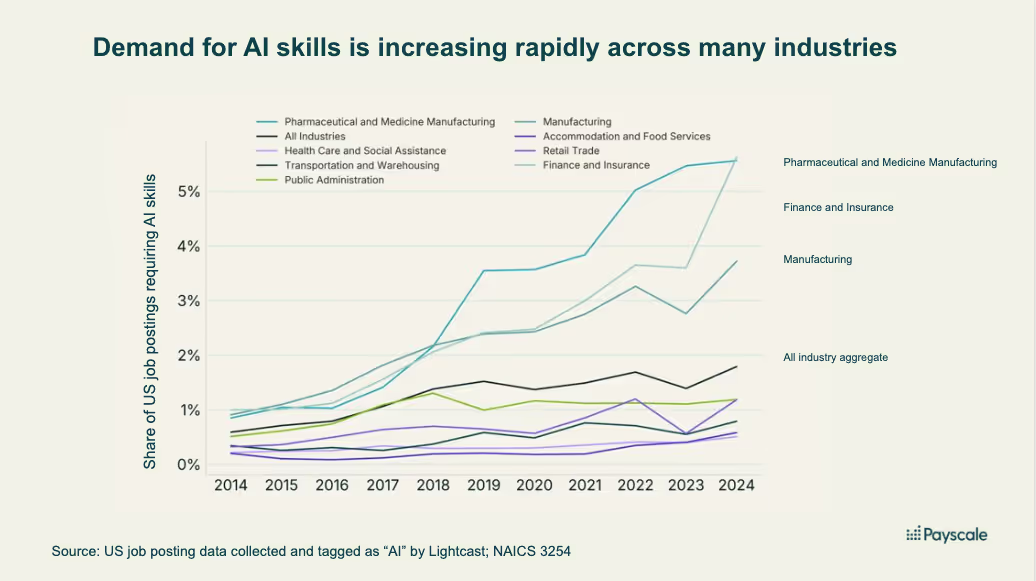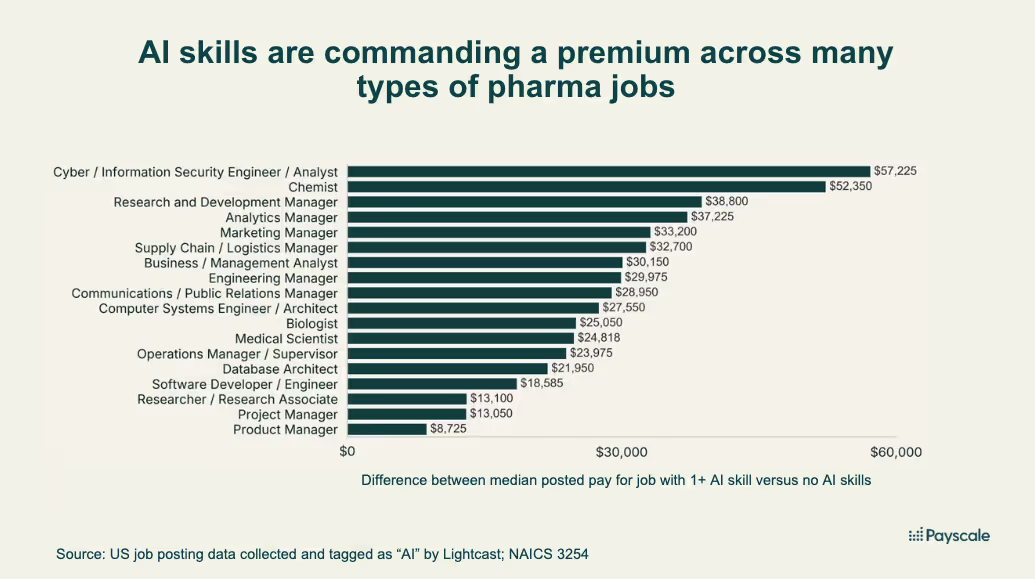While many employees worry about how artificial intelligence will impact their jobs, those with AI skills are raking in pay premiums.
A recent report from the labor market intelligence platform Lightcast revealed that job postings mentioning AI skills commanded 28% higher salaries.
Our Compensation Best Practices Report also showed 25% of HR practitioners now factor competitive skills like AI into their compensation strategy.
What are AI skills? AI skills range from basic AI literacy (prompt engineering, understanding AI outputs) to advanced capabilities in machine learning, neural networks, and AI model development.
Thinking about the rise of AI skills in the job market, I’m reminded of a classic economic paper “The Economics of Superstars” by Sherwin Rosen.
Rosen looks a markets dominated by a handful of standout talent whose value relative to second-tier talent is immense. Think about LeBron James’ value compared to a benchwarmer.
James’ ROI (not just helping his team win, but also brand endorsements, TV revenue for the Los Angeles Lakers) creates a winner-take-all dynamic. James' billionaire status reflects this phenomenon.
As does the reported nine-figure salaries Mark Zuckerberg recently offered top AI engineering talent. Zuckerberg is betting these engineers will dramatically increase Meta’s revenue.
Silicon Valley has long put stock in the idea of the “10x engineer” — computer engineers so talented they’re worth 10x more than your average CS major.
AI is the 10x engineer on steroids, driven by supposed differences in impact and intense competition for a limited supply of top talent.
But should AI skills be so highly compensated? I don't know. What we're seeing now is a supply problem. Artificial intelligence is relatively new, so not many workers are AI-fluent.
At least, not yet.
The 10x engineer isn’t a myth, but it’s often misunderstood. They don’t code 10x faster than their peers. They’re not 10x as brilliant. Instead, they’re able to socialize solutions quicker. They’re the people other engineers ask for help.
What organizations need are employees who grow AI adoption across teams, and ultimately, their organizations.
It’s less about rewarding LeBron James because of his basketball skills, and more because he makes the players around him better.
AI job growth and pay premiums across occupations and industries
Jobs requiring AI skills have seen a upwards trend since ChatGPT appeared in November 2022.

We've seen a greater than 33% spike in job postings asking for AI skills since May of this year.
Digging further, I pulled the top occupations requiring AI skills from job posting data.

We see the usual suspects: Data Analysts, Software Developers, Financial Analysts.
Marketing Managers and Specialists also make the list — the field has become much more data-driven with the rise of performance marketing.
The picture gets more interesting looking at industries requiring AI skills.

Take Manufacturing for example. AI is one of the fastest growing skills. Why?
We must first abandon the idea of Manufacturing as an assembly line. Our recent Manufacturing Wage Trends Report showed that knowledge workers are the industry’s hottest hires.
Our report highlights a surge in Manufacturing for AI Engineers, Regulatory Affairs Managers, and Supply Chain Analysts. This reflects a broader shift in the industry toward automating functions like compliance and logistics.
In Manufacturing, postings for AI engineers alone have grown 171% YoY. Job listings requiring skills like AI and SQL competency further signal a shift toward an automated, knowledge-intensive sector.
AI jobs are growing across many (maybe even most) industries.
Some organizations are treating AI-fluent job candidates like superstars, offering pay premiums well above other compensable factors.
For instance, AI jobs have made inroads in BioPharma, which show up in big way in employee’s paychecks.

Chemists might be unexpected for those outside the industry. But the 2024 Nobel Prize in Chemistry went to scientists using artificial intelligence to revolutionize protein design — so not surprising after all.
AI jobs in healthcare are experiencing explosive growth. Beyond biopharma chemists earning pay premiums for AI skills, healthcare organizations are hiring for AI-driven diagnostic roles, clinical data analysts, and healthcare AI specialists. These positions require artificial intelligence skills like natural language processing for medical records and machine learning for patient outcome prediction.
The real story isn’t how many jobs AI has infiltrated, but instead how much employers are willing to pay for this skill for certain jobs. $52,000 more for an AI-fluent chemist.
AI isn’t just reshaping how work gets done — it’s changing the market worth of roles.
Whether you’re a chemist designing new molecules or a marketer personalizing emails, AI skills have become a significant salary multiplier.
Creating a sensible AI talent strategy
Some employers have internal estimates that show AI-fluent employees are 1.2x to 1.5 more productive than their peers.
In some cases, these estimates are grounded in data, but in other instances, they’re driven by a top-down strategy or even near-term market gains. The stock market has rewarded companies that reduce workforce in the name of AI investment.
Earlier, I said that I didn’t know if the pay premiums for AI skills were worth it. You’ll remember that my argument was less about AI itself (a highly valuable skill) and more about the role of superstars.
Bringing in LeBron James will certainly make your team better, but the other players matter, too. We often forget that Michael Jordan won zero championships without Scottie Pippen.
What matters more? An AI-fluent employee able with the communication skills to expand the adoption of artificial intelligence across your organization? Or a single brilliant Software Developer with AI skills?
The answer should be obvious. Meta quickly pulled back in poaching AI talent after recent hires clashed with existing leadership.
Because, at the end of the day, team dynamics matter. Critical thinking and social skills are still in fashion. Blindly hiring for AI skills might lift your stock price, but it’s not a coherent talent strategy.
The problem?
Most organizations have no clue how to pay for AI skills. Benchmarks aren’t keeping up with the actual market. Job descriptions are changing, as illustrated by the most recent spike in AI skills requirements beginning in May.
When new skills (like AI) are added every month or week, HR practitioners struggle to price roles appropriately. AI-fluent employees leave your organization for higher-paid jobs elsewhere and you can’t attract new hires.
More significantly, you simply don’t know the talent you need to drive results.
That’s where we come in. As the VP of AI and Data Science at Payscale, I’ve seen clients struggle. Whether it’s a Manufacturing org wondering what pay premium to apply for a Logistics Analyst with AI skills or a BioPharma firm struggling to retain AI-fluent Information Security Managers.
While you can guess, we actually know. Our 160+ person R&D team will help you build a talent strategy that puts you ahead of the AI curve.
Thoughtlessly throwing money at AI Engineers isn’t the answer. Unless you have Meta’s war chest.
But it’s equally foolish to sit on the sidelines because you don’t have the data. The HR practitioners that get it right (fully harnessing AI as business driver) will take a data-driven approach to job pricing.
They’ll add AI headcount where it makes sense and avoid overspending on “superstars” just because its trendy.
AI skills are already reshaping your workforce. And making the right decisions about where to spend money demands the best data.




.avif)

